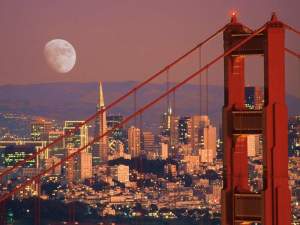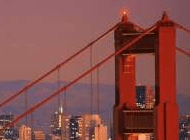 Three short years ago, almost to the day, I arrived in San Francisco and instantly fell in love.
Three short years ago, almost to the day, I arrived in San Francisco and instantly fell in love.
As a former technology columnist for the Guardian (and, unbeknownst to me, about to become one again), I had more than a passing familiarity with the goings on in Silicon Valley. But unlike most tech writers, I’d never had more than a fleeting desire to actually come here.
London was my town – profane, drunken, debauched, wonderful London. Sure, our tech startups might never amount to shit on the Valley’s shoe, but by God we knew how to party. And I loved it; literally writing the book on the capital’s entrepreneurs and the fun we all had during the first three-quarter decade of the 2000s.
Fittingly, given what I’m going to say in a few lines’ time, it took a chance encounter at South By Southwest to change my mind. A pretty, enthusiastic girl called Eris who jumped on my shoulders at a party, under the misapprehension that we’d met once before.
“How are you?” she yelled into my ear.
“Uh… who are you?” I replied.
“We met in San Francisco” she insisted.
“Seems unlikely,” I said, “I’ve never been.”
“Oh my God, you have to visit after South By Southwest, you’ll love it”
And so I did, and so I did. Within months my British cynicism faded, my short-lived gig at the Guardian became a long-lived one at TechCrunch, I settled into a social scene – first a hectic one, then a more grown-up one, I (finally) quit drinking, I shed 42 pounds (the “quit drinking, start walking up hills” diet) and generally made myself at home in the skin of an adopted Northern Californian. Today I wish the bag-packers at Whole Foods a nice day as sincerely as if I truly gave a fuck. Hell, perhaps I do give a fuck. They all seem so nice.
And yet for all that I’ve loved my time here, I can’t help but wonder if I’d make the same decision today.
Let’s start with South By Southwest: otherwise known as spring break for Valley fanboys. Just three years ago, it seemed like a conference packed with potential: Twitter had just reached its early adopter tipping point, Foursquare was barely a gleam in Dennis Crowley’s eye (he was too busy celebrating his recent sale of Dodgeball to Google) and a business reporter called Sarah Lacy was interviewing Mark Zuckerberg in front of a crowd of screaming Facebook fanboys for whom their idol could do no wrong.
Today Foursquare is the new Twitter, Twitter is the new Facebook and many of those same fans who cheered on Zuckerberg now vilify him for failing to safeguard their privacy. Sarah is now Senior Editor at TechCrunch who spends the bulk of her time reporting on entrepreneurs outside the Valley. Zuck is old news — Rwanda, China, India and Brazil are where the real action is.
For all those reasons, I’m not sure SXSW would have the same draw for me today. It seems like a sad anachronism: a gathering for those who care less about world-changing products and services, and more about the latest fucking location fucking based fucking mobile fucking app. It’s also way outgrown its venue: it’s nigh-on impossible to get a hotel room in Austin this week, and the flights to and from the city are all booked up. For all of those reasons, many serious entrepreneurs and reporters are staying away.
But even if I did end up in Austin today, and even if I had a chance encounter that inspired me to travel to San Francisco, I’m certainly not sure I’d fall so instantly under the city’s thrall. Because, as with SXSW, the magic has moved on from here too. There was a time, not that long ago, when each new day in the Bay area seemed to dawn with the arrival of a game-changing company. A Facebook, or a Twitter or a Google or a Tesla. Today it all seems so – I dunno – derivative.
A few weeks ago I attended a drinks reception at the home of a prominent Valley angel investor. Also in attendance was a young entrepreneur who, according to our host, was creating “the next Facebook”. The entrepreneur in question was – to say the least – hesitant to talk to ‘the press’ (the press, in this case, being me, Mike and Sarah, eating pizza). “Are we off the record?” he asked, when I enquired what his app actually did. This, by the way, was an app which had already launched. More worrying was his answer to the question “what are your plans for the app?”.
Without a flicker of irony, he replied “we’re going to be a billion dollar company.”
“You realise that’s not just a thing you can decide to be?” I asked.
A glare this time. A shrug. And then again, as if he were addressing a simpleton: “We’re going to be a billion dollar company.”
“How?” I said.
“You’ll see,” came the reply.
It was only then I noticed his outfit. Everyone else was in smart-ish jeans and shirts, but the entrepreneur was carefully dressed in a hoodie and a pair of open-toed flip flops. Later investigation would reveal that his “billion dollar” app was a social network for people with .edu addresses. The secret sauce? The fact that it gave college kids a way to flirt around campus.
Any of this sounding familiar? All he needed to complete the picture was a couple of embittered rowing twins baying for his blood, and maybe a central casting Svengali urging him to consider “what’s cool…. a trillion dollars”.
All over the valley, I’m seeing the same depressing picture. Kids who have grown up memorising the playbook of Mark Zuckerberg or Evan Williams or Dennis Crowley and who think that by literally imitating their idols, they too will achieve the same success. The true lesson is lost on them, like it was lost on the thousands of would-be directors who – inspired by the apocryphal Spielberg story – tried to brazen their way on to the Universal lot carrying a briefcase full of self-confidence. It’s only cool when you’re the first one to do it.
Of course, I’ve only been around for one cycle, and it’s quite possible it was ever thus. Maybe at the same time Zuck was blowing up, there were a couple of dozen Jerry Yang or Larry Ellison clones shaving their eyebrows and bleeding purple around the Valley. I’d ask Mike Arrington what it was like a decade ago, but he’s moved to Seattle so he’s not quite so easy to get hold of. I’d ask Sarah, but she’s in Indonesia. Even Eris, the girl who convinced me that SF was the best city on earth, has moved to New York to work for a bank.
I just landed back at SFO following ten days in Los Angeles, where a friend of mine is negotiating a film deal. During my trip, I hung out with old pals from London including a few who are now working as screenwriters and actors and comedians. Despite being firmly ensconced in “old media” they all seemed to be having a ball. Likewise on a recent trip to New York, I was inspired by the unwavering passion of my journalist and author pals – who have kept their sense of wonder, even as all their industry faces its greatest challenge since the great ink drought of 1885. The reason for their enthusiasm? Partly it’s because their jobs are awesome; writing books and films and TV shows is a whole lot of fun.
More than that, though, it’s a form of Blitz spirit: the same energy that Sarah found in emerging markets, and wrote about in her new book. The business of “old media” is so screwed that, like an entrepreneur building a business in Rwanda, its participants have nothing to lose by taking ridiculous commercial and creative risks on the basis that – as William Goldman put it – “nobody knows anything”. The risks may pay off, they may not – but in a climate of total uncertainty the one thing you should never do is try to duplicate what worked in the past.
Just three years ago that same spirit used to typify the Valley, and was the antithesis of Hollywood and New York media’s obsession with derivative dreck. But as more and more 20-something tech billionaires were minted and become the new breed of investors, so their impulse to invest in mirror images of themselves has seriously stunted risk taking and creativity in the Valley. Meanwhile, waiting for the ominous click of the firing squad, it’s the old media players who are once again taking all the risks and having all the fun.
What I’m trying to say, I suppose, is this: I’m bored. Yesterday, when I landed back at SFO, I felt something I haven’t felt in three years: regret. I missed LA instantly. Today I looked at the cost of hotel rooms in New York – and I fired off an email to my publicist back in London to say I’ll definitely be back in May to promote my new book. I’m looking forward to a couple of weeks of old media press junkets and of drinking (orange juice) my way through literary London. And it’s not just me: of the five new friends I made during my first week in San Francisco – all of whom work in tech – four no longer live here. Moreover, of the dozen or so friends I’ve known longest here, all but – maybe – three have recently talked about leaving, citing the fact that more interesting opportunities for creativity and business exist elsewhere.
Of course, there’s no reason why the Valley or any of its inhabitants should give a damn whether I stay or go. Except — well, maybe there’s just one reason. Over the past few years, I’ve made a decent living writing about interesting people – entrepreneurs, creative types, wasters, losers and bums alike. As such, I tend to live in places where unique characters can be found, and to leave places where they can’t. A few years ago, Silicon Valley felt full of exciting people doing fascinating things. Sarah wrote a book about them, as (with a different level of fidelity to the source material) did Ben Mezrich. Aaron Sorkin wrote a movie. Today Lacy, Mezrich and Sorkin have moved on and it’s hard to imagine which stories might inspire a writer in today’s Valley. The Path Story? Instagram: The Movie? Desperately Seeking Quora? Please.
It’s an old Chinese curse to wish your enemy might “live in interesting times”. But interesting times also tend to be the mother of invention and revolution. And it’s in that spirit that I wish the Valley’s times were a little bit less charmed right now, and a little bit more interesting.
For an idea of how likely that is to happen, let’s jump back to the Zuckerberg clone I met at the party. The writer, and misanthropist, in me would love to report that investors sent him back to the drawing board and come up with something truly new and innovative. Something exciting. Something worth writing about.
The truth, though, is that his college-based social network recently secured a huge round of funding, not just from the party’s host, but also from one of the Valley’s biggest investment firms. It’s certainly possible that he’ll achieve his dream of a billion dollar exit, but even if he does, the story has already been told, the excitement spent.
I assume he’s already been booked for next year’s South by Southwest keynote.
